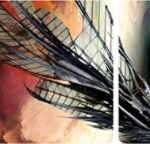Oh, Glen Cook, I wish I knew how to quit you.
Last of the Dinosaur Published authors to command my allegiance, Glen Cook is a modern master. He is everything that George Rape Rape Martin’s fans wish that fat old pervert was.
With the Starfishers Trilogy, Cook paints a broad canvas of a universe whose principle drivers are a handful of larger-than-life characters including a number of the usual Glen Cook cliches. No less than three crusty old warriors weary of the mercenary life (but too locked into their rut to escape the fate of all such men) populate the story, but here Cook gives them a much softer side. Family men, their motives generally revolve around their relations and attempts to buy a path out of the blood-letting business for them.
Written in the usual terse style that only rarely breaks action long enough to provide a dash of description or technical specifications for the toys used by the characters, Cook once again only gradually draws back the curtain on a universe with five major power centers. Set a thousand years in the future, a recent war broke the power of a mysterious race of men called the Ulantids, who linger only as a feasome shadow. The rise of a powerful confedration navy means the end of the days of the slaver fleets of the Sangaree and the mercenary legions who once kept both in check. Throw in a mysterious wild card in the shape of void ships, the Starfishers that give the trilogy its name, and you’ve got all the makings of a fine old space opera.
The central conflict of the first book in the trilogy revolves around a massive strike of valuable ore discovered on a backwater planet nearly inimical to life. The titular shadowline is a relatively cool patch of land on a planet that makes Mercury look downright arctic, and the challenges of life and death there play a key role in the resolution of things. It serves as a constant reminder that this is more than just a fantasy tale with the serial numbers scraped off. The tech means a lot, and the setting of that core conflict helps establish high stakes and the sci-fi backdrop.
The big, splashy battles and the twisting political battles that weave three separate stories together are all tied up thanks to the personal stakes for all involved. The tech that allows men the lifespan of centuries also allows for the development of some rather knotty family trees. Half-brothers, lost sons, and adoptive fathers serving their foundlings loyally all play a role, as does a heavy influence of old norse sagas. The pater familias of the most powerful mercenary clan around is a one-eye old warrior with a pair of ravens. It’s not exactly subtle.
It is exactly good. At nearly 40 years of age, this is a timeless tale, and one that drives forward with the same relentless pace as all of Cook’s works. Here, he operates at the top of his game, placing forward motion of a convoluted plot foremost, characterization of the cast second, and all else a distant third.
It makes for good reading, and as such Cook remains one of the few authors still working in Dinosaur Publication who writes books with a spine worth cracking.


